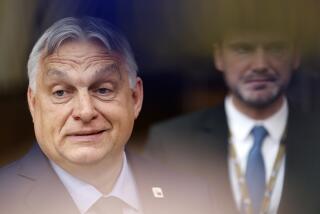Those Who Stayed Awake Won’t Be in Bluejeans Long : Czechoslovakia: The next generation of leaders may look like a ragtag crew today. But tomorrow they will be ready to govern.
- Share via
You look at them on your TV screen and wonder: Is it possible that these people could govern Czechoslovakia?
True, there is one familiar face and name. He wears a suit and tie. He is Alexander Dubcek, leader of the 1968 Prague Spring, whose search for “socialism with a human face” preceded Mikhail Gorbachev’s perestroika and glasnost by many years.
Before Dubcek showed up at Prague’s Wenceslas Square late last month to address hundreds of thousands of his countrymen, he had not been seen for years. Today, he is an anachronism--a reform-minded Communist in an anti-communist land. Still, Dubcek is destined to serve initially as the country’s ceremonial president.
Unlike Dubcek, there are others--parties and individuals unknown in the West but well-known in Czechoslovakia--who are rapidly changing their political color to suit the new popular mood. Allied with and subservient to the Communists for decades, the Socialist Party and the People’s Party are now presenting themselves as a non-communist alternative to the old and discredited regime. Yet these allegedly non-communist leaders are tainted; their parties would have to be fundamentally transformed before they are accepted by the Czechoslovak people.
Take Bohuslav Kucera, chairman of the Socialist Party. He has been a highly visible and vocal supporter of the post-1968 political order. In recent years, he served as deputy chairman of the Federal Assembly, deputy chairman of the Legislative Council, chairman of the European Security and Cooperation Committee of Czechoslovakia, chairman of the Czechoslovak-Belgian Friendship Society as well as being a member of the Presidium of the Czechoslovak National Front.
A lawyer by training and an intelligent man, Kucera was the ultimate fellow traveler. He showed up at diplomatic receptions and presented himself to Western visitors to demonstrate that non-communist politicians fared well in “people’s Czechoslovakia.” Will he now retain his positions? Perhaps with his encouragement, his party has made its facilities available to opposition forces. Some of the recent speeches shown on TV were made from the balcony of the Socialist Party. But Kucera’s ability to stay near the center of power in a democratic Czechoslovakia is highly doubtful.
The new leaders of this wonderful country in the heart of Europe are likely to be those unshaven and casually dressed people seen on TV--mainly young, politically astute but inexperienced, and long dismissed as insignificant troublemakers by propagandists of the old regime. They kept their faith in jail. They kept their faith while in hiding. They kept their faith when their books, papers and typewriters were taken away and when their telephones were disconnected. And they kept their faith for two long decades after ‘68, when a largely apathetic public stayed away from the political limelight. While most of Czechoslovakia slept, they were awake.
In terms of European political categories, some of them define themselves as Social Democrats, some as Christian Democrats, some simply as Western-type liberals or conservatives. They are still united because the main issues--removal of the country’s Communist leadership and the creation of a democratic political order--unite them. But when elections come in 1990, the struggle for power and position will begin. Personal rivalries will surface. That appealing sense of camaraderie will fade. Something will be lost, but something more will have been gained: normalcy will have returned to Czechoslovakia.
The men who are trusted today by the people are not professional politicians. Vaclav Havel, the courageous leader of Civic Forum, is a playwright whose works have not been performed in his native land for decades. Jiri Dienstbier, the forum’s very wise spokesman, is a journalist who had to make a living as a stoker. Jan Urban, who speaks several languages, is also a journalist working (when out of jail) for Western publications.
Some day soon they will get haircuts and trade their bluejeans in for suites, and they will begin to govern.
Recall that before he became the gray eminence of Polish politics, Lech Walesa was an electrician. In Hungary, the leaders of the new non-communist parties campaigning for elections next March are just beginning to look and act like the professional politicians they have so quickly become.
There is little left of the simple dichotomy between “us” and “them,” the time when people could be easily divided into those who sought freedom and those who defended communism is all but gone. The topics of today are parliamentary procedures, or the privatization of the economy. Increasingly, the main issue is not even how to gain power but how to use it once gained.
Bluejeans or not, in Eastern Europe, at long last, the times they are a changin’.
More to Read
Sign up for Essential California
The most important California stories and recommendations in your inbox every morning.
You may occasionally receive promotional content from the Los Angeles Times.










